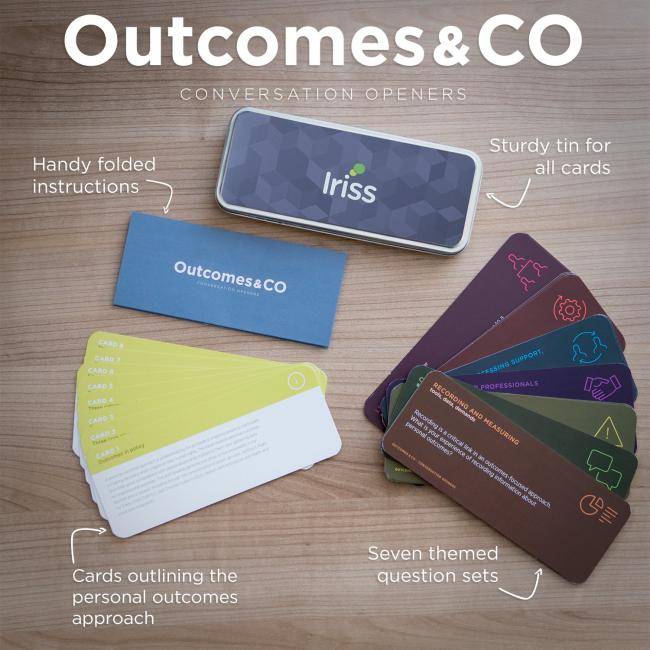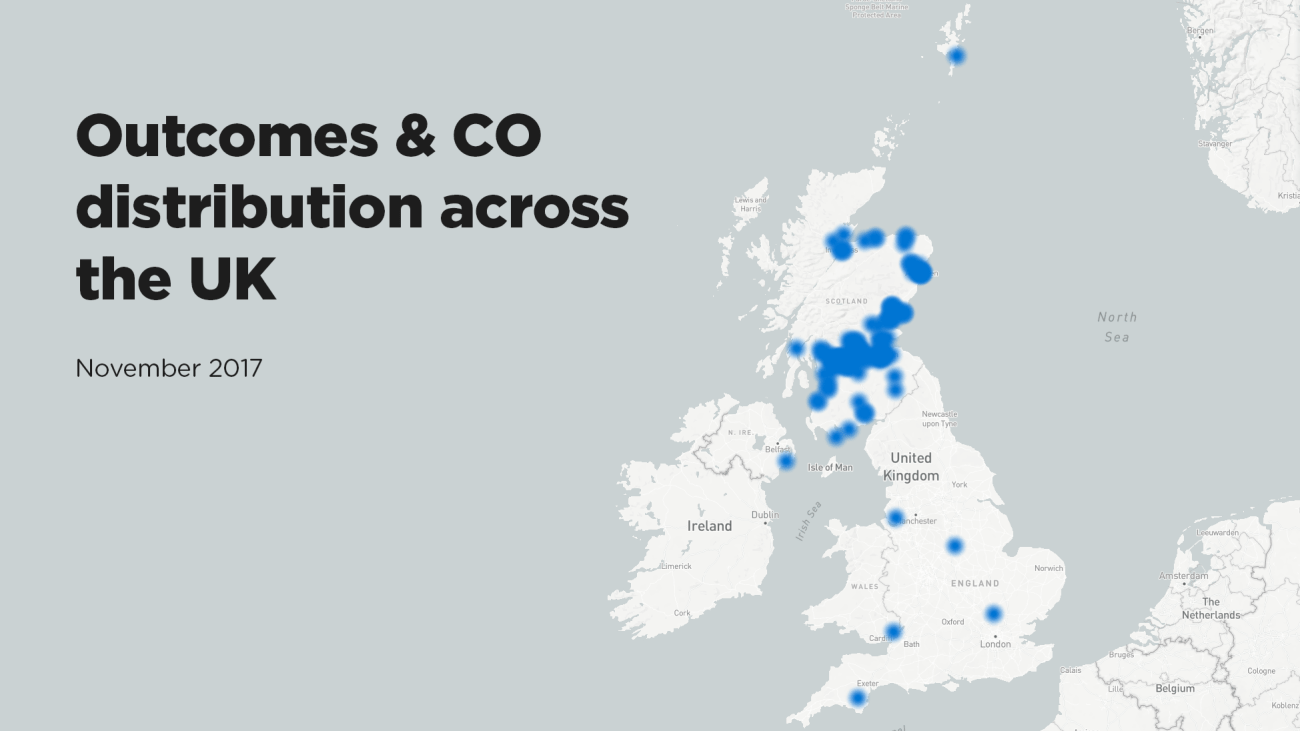This is a summary of what we know so far about the reach and impact of the Outcomes & CO tool based on information gathered between 8th May and 2nd October 2017. The summary provides:
- Overview of the tool
- Figures - how many, where, who
- Information about the survey and respondents
- Key messages and learning from the survey
- Next steps
About the tool
Outcomes & CO: conversation openers was created to support practitioners and managers across the social services sector reflect on their views, values and experiences of a personal outcomes approach. Personal outcomes are defined as what matter to people accessing support and their unpaid carers (adult and young).
Outcomes & CO provides a framework for open, honest conversations about personal outcomes. It does this by supporting reflective practice and building common understanding. It is flexible and can used or adapted for a range of audiences, including health and housing.
This tool builds on a range of resources developed by Iriss and partners to support an outcomes-focused approach in the social services sector, in particular, the Leading for Outcomes series (Iriss, 2010-2013) and the Values and Principles Paper developed by the Personal Outcomes Network.
The design of this tool was inspired by Relationships Matter (Iriss, 2016), a conversation tool to support practitioners reflect on caring for young people who are leaving care.
Anticipated outcomes of the tool
- Increased awareness and understanding of the key components involved in a personal outcomes approach
- Improved understanding of the landscape in which a personal outcomes approach exists
- Improved awareness and understanding of the views, values and experience of a personal outcomes approach for individuals and teams
- Shared understanding of an outcomes-focused approach across teams and between practitioners, the people they support and their unpaid carers
- Increased confidence about understanding and practising an outcomes-focused approach
- Improved reflective practice
How to use the tool
This tool comprises seven themes, each with a set of related questions. A set of information cards outline the building blocks of the personal outcomes approach. The information cards are relevant across the themes and aim to foreground the questions. These can be used as stand-alone conversation prompts or background reading before using the tool.
Figures
- Launched: 8th May 2017
- Page views: 1892
- Downloads of pdf version: 434
- Total number of print copy sets produced to date: 600
- Total number of print copies requested through website: 262
Reach across UK
Breakdown of organisations by sector
- Voluntary - 50
- Unknown (personal email addresses) - 27
- Statutory - 26
- Independent - 14
- Academic institutions - 7
- Health - 3
- Regulator - 1
About the survey
A short survey was created as part of the tool guidance to provide an opportunity to gather feedback and try and assess impact. Communications about the survey were circulated through our mailing list and Twitter during August and September 2017. Those who had requested a print copy through the website were contacted directly to request their feedback. The survey as incentivised using the offer of a free, tailored workshop on the tool.
The survey asked respondents:
- Their role, organisation, contact details
- Their motivation for using the tool
- What they hoped to achieve and if these hopes were realised
- How the tool was used and by whom
- Their learning and what needs to happen to put this into action
- If they would use the tool again
- Any other comments
Respondents
30 respondents from across 25 organisations (10 local authorities, 2 universities, 9 third sector, 2 independent sector, 2 public bodies)
Roles of respondents included
- Student
- Social worker
- Manager
- Chief Executive Officer
- Improvement advisor
- Development manager
- Lecturer
- Practice educator
- Strategic procurement manager
- Nurse
- Director
- Learning and development officer
Learning
What did the survey tell us?
Overall, the feedback was very positive, telling us the tool is useful and well pitched to our audience. Specifically, the feedback confirmed what we hoped about the accessibility of the tool - that it would be useful to a range of people across the sector in different roles. Students, social workers, managers and directors had used the tool. Their motivations were also in line with what we thought our audience might need around personal outcomes - inspiration, guidance, new ways of thinking, structure, confidence.
It was encouraging to hear about the diverse contexts people had found for using the tool from team meetings and supervision to discussions with people accessing support and carers. This also suggested that respondents felt comfortable adapting it to their needs and to the situation in which they wanted to use it.
The learning points mentioned by respondents also demonstrate the value of conversations about personal outcomes and the benefit of having what can be a complex area broken down into a simple structure.
In terms of the language and design of the tool, these were also well received. There was a strong appreciation that the tool came in a print copy version which is a useful reminder in what can be a digital-first environment.
Summary of feedback
Some of the responses were closely linked and so are grouped together where appropriate in this section. Some respondents said they had not used the tool in depth but described their plans for using it.
Motivation and hopes for using the tool
- Learning, development and training
- To engage staff in conversations about outcomes
- Ideas and structure for supervision
- Student support - placement learning and for practice educators
- Guidance
- Structure
- Reflection
- Improve understanding of outcomes - be more ‘fluent’ in understanding
- Improve recording
- Challenge thinking
- Inspiration
- Build confidence
- Ideas
Did you achieve what you hoped to?
Overall, respondents felt they had achieved their outcomes.The cards were found to be ‘informative’, ‘user friendly’, ‘easy to understand’, ‘real, not jargonised’, ‘clear’. People liked that the themes linked but could also be used as stand alone topics.
How was the tool used?
The tool was used in a range of settings including:
- Team meetings and discussions
- Supervision (group and one-to-one)
- Development session
- As part of training pack
- Used to support new resource tool
- Appraisal
- One-to-one with service user
- Reflecting for home visits
- Induction
- Carers event
- Recruitment
Who used the tool?
- Housing support staff
- Involvement and quality manager
- Staff with a view to them using with people accessing support
- Staff, team managers
- Involvement manager, senior manager, leads for outcomes
- Care at home staff, care home staff and carers
- Children’s services (young people support and transitions); adult services; child residential services
- Team manager and social workers
What did you learn?
Even used on a small scale that it encourages debate
Helped to simplify our way of talking about outcomes
A better understanding of outcomes
We learned that by good conversations and focusing on what matters this can provide better outcomes for individuals but also ensure staff can be motivated to work in outcomes and move from traditional models of service delivery.
Breaking down the outcomes made sense to people
That it doesn’t have to be difficult or complicated to open a caring conversation
How to bring about outcomes discussion and how this can balance conversations to become future focused and more motivational. Example of learning: carer recognised self as a carer, then seeing how respite funding would improve health and relationships (was contemplating separation)
Some different ways of thinking about risk
Useful conversation openers eg re risk, working with other professionals and how we might use these as part of group supervision
The language we all use is different and it took people time to ‘get their heads round’ the questions.
The tool is good for reminding busy people and organisations of the importance of outcomes-focused practice. It’s a constant effort to stay focused on this.
Good way to open up areas for discussion that we usually take for granted.
Would you use it again?
Overwhelmingly, respondents replied that they would definitely use the tool again.
Other comments included:
Lovely quality cards feel nice and looks like something worth paying attention to and tin sits on desk so reminds me to use it.
I believe it is an authentic tool which can create the framework for better conversations with individuals and ensure we are constantly seeking what matters to people and providing a redesign of services to support different outcomes.
Thanks for the sample, really appreciated
Well done! Would like more tins so they can be shared across the home
Liked the tin
I would be good to include some conversation openers that could be used by workers enabling they support to talk about their personal outcomes
I think they are well designed and look good. I hope they will stimulate some useful discussions during our planned workshops.
Thanks for sharing the tools for us to use. I think good design is important and these tools are attractive. They are a nice little addition to our personal outcomes armoury.
Great tool, saves so much time!
Like the fact that it is physically tangible and not on-line
Next steps
The information in this summary can give us some initial indication of people’s experience of the tool but it’s still early days. The tool is new to the sector and it will take time for it to be embedded and for its anticipated outcomes to be fully realised. However, it is important that Iriss continue to promote the tool as well as support the workforce to use, adapt, embed and evaluate it. We can do this by regular communications about the tool, gathering feedback and sharing examples of how people are using it to inspire others.
Partnership & CO
Based on the positive response to Outcome & CO, we have developed a conversation tool to support discussions about partnership working in the sector. Based on the learning from a collaboration between Iriss and the Dundee Early Intervention Team, Partnerships & CO is now available.
For more information, please contact enquiries@iriss.org.uk


